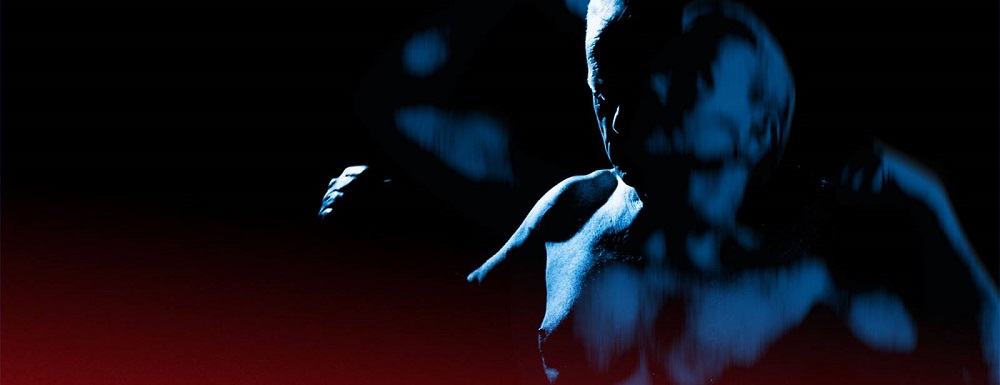The selfie – a modern portrait of ourselves. Used far too freely, this tool enhances our wish for validation. We merrily click away, posting on social media, a very often altered view of ourselves, in the hope of a flow of admiring comments.
Vanity – one of the seven deadly sins! ‘Dorian’ shows us just how easy it is to fall into the trap of becoming self-obsessed, preening yourself and no longer seeing the people around you.
The play begins with Dorian (Rick Ferguson) feeling old. He is 54 and feels that his body is not a temple and Sarah (Elizabeth Harborne), encourages him to go to see Harry (Chris Casey) who is a personal trainer. Sarah, in her role as an image consultant, creates a photo of how Dorian would look if he worked hard at training for six months. Harry’s job is to push Dorian to be the best physical version of himself but as Dorian points out, age is not on his side. With Harry’s promotional logo, ‘Get Hench with Harry’, he doesn’t exactly encourage people to be themselves, but a stereotype, a beefed-up version.
Dorian’s son, Sam (Neil Balfour), is a musician and has always had issues about his weight. He is still trying to get over his mother’s death and added to this, Sarah, puts pressure on him to change his image as she feels that to promote their music, he needs to ‘look the part’.
Once again, we are brought back to the subject of body dysmorphia, our modern-day obsession with how we look, to others.
On stage, the back wall is made up of screens that are interactive, showing the selfies that have been taken by the cast. This works well as the modern-day audience can relate to this. For those of us who have read ‘The Picture of Dorian Gray’ by Oscar Wilde, the selfie is a contemporary version of his picture. I must admit to not really being sure how useful the window’s on wheels are (for the want of a better explanation), they almost seemed to act as a barrier to the free-flowing movement around the stage, but maybe I missed their significance. I did at one point expect more use of one of these as a mirror to be used for vanity purposes.
Proper Job Theatre Company have a physical process that they follow inspired by the Russian theatre technique, Meyerhold’s Biomechanics. This physicality can be witnessed in this production and makes for an exciting, energetic performance. Combine this with the engaging writing of Andrew McMillan, who wanted to focus on our image conscious society today, where masculine vulnerability can sometimes be masked by a large physical presence and the ideal setting for this observation, is at the gym.
During the play, Sam’s songs are played giving us an insight to his mind. Tim Cunningham’s music fitted well into the play and it showed off Neil Balfour and Elizabeth Harborne’s skills as musicians and vocalists.
Overall, this play is an excitingly, refreshing take on this classic tale of vanity. Inspired by Oscar Wilde’s masterpiece, it can act as a conscience - a reminder to be kind to our fellow human beings!
Reviewer: Caroline Worswick
Reviewed: 30th October 2019
North West End UK Rating: ★★★★

